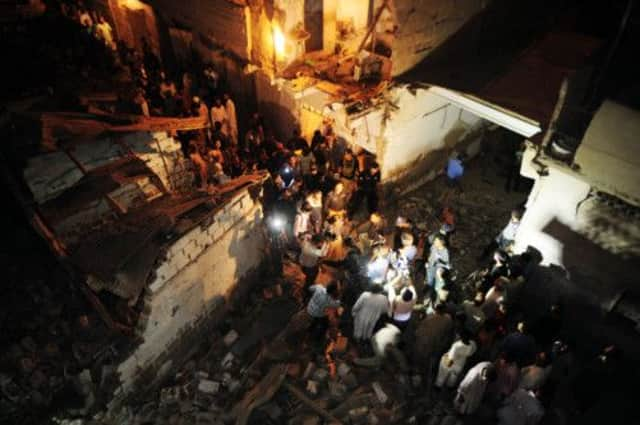Pakistan bomb kills nine at political offices


In first attack, on the outskirts of Kohat city, a bomb ripped through the office of Syed Noor Akbar, killing six and wounding 10 people, police official Mujtaba Hussain said.
A second bomb targeted a campaign office of another candidate, Nasir Khan Afridi, in the suburbs of Peshawar city. That attack killed three people and wounded 12, police official Saifur Rehman Khan said.
Advertisement
Hide AdAdvertisement
Hide AdBoth politicians, who were not in the offices at the time of the blasts, are running as independent candidates for national assembly seats to represent constituencies in Pakistan’s lawless tribal areas, where scores of militant groups operate including some with links to al Qaida. The general elections will be held on May 11.
Pakistani Taliban spokesman Ahsanullah Ahsan claimed responsibility for both attacks, as well as two others against secular political parties in the southern port city of Karachi.
“We are against all politicians who are going to become part of any secular, democratic government,” he told The Associated Press by telephone from an undisclosed location.
The Taliban previously announced a strategy to target three political parties, including the Awami National Party (ANP), the Muttahida Quami Movement (MQM) and the Pakistan People’s Party (PPP). All three are perceived as liberal, having earned the Taliban’s ire by opposing the insurgency and extremism during their time in the outgoing government.
The onslaught has forced many of the parties to change their campaign strategy and has raised questions about whether the vote can be considered valid if some mainstream parties can’t properly take part.
Such attacks have killed at least 28 people in just last four days.
One of the most serious attacks occurred on April 21, when a suicide bomber blew himself up outside a meeting of the ANP in the north-western city of Peshawar, killing 16 people. The Taliban said the target of the attack was Haroon Ahmad Bilour, whose father, a senior party leader, was killed in a suicide bombing in Peshawar in December. He escaped unscathed, but his uncle, Ghulam Ahmad Bilour, suffered minor injuries.
In the capital, Islamabad, Pakistani officials said they planned to seal the border with Afghanistan and restrict the movement of Afghan refugees on election day.
Advertisement
Hide AdAdvertisement
Hide AdOfficials at the Interior Ministry and the election commission have said that the measure is aimed at preventing terrorist attacks during the vote. However, officials did not say how they would restrict the movement of hundreds of thousands of people spread out across the country or block crossings along the porous border. Pakistan announced similar measures in the past but failed to take action.
The Islamist and centre-right political parties have been spared by the Taliban and have been holding big public rallies without fear of being attacked. They largely support peace talks with the Taliban instead of military offensives.
The leaders of the political parties under Taliban attack have said the violence amounts to election rigging. But they have, so far, decided not to boycott the vote.